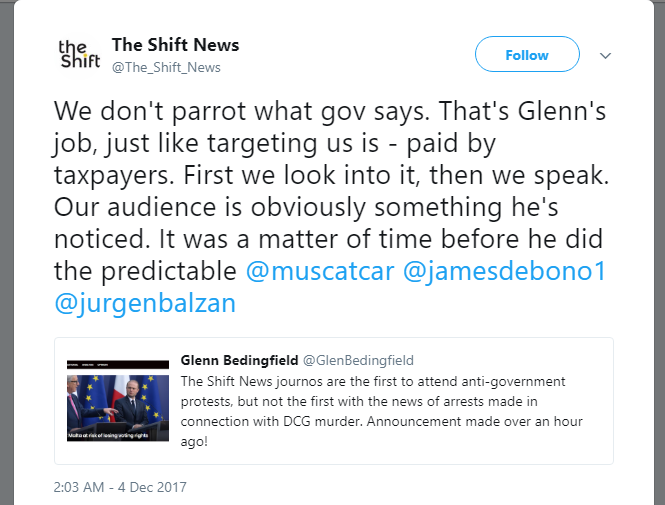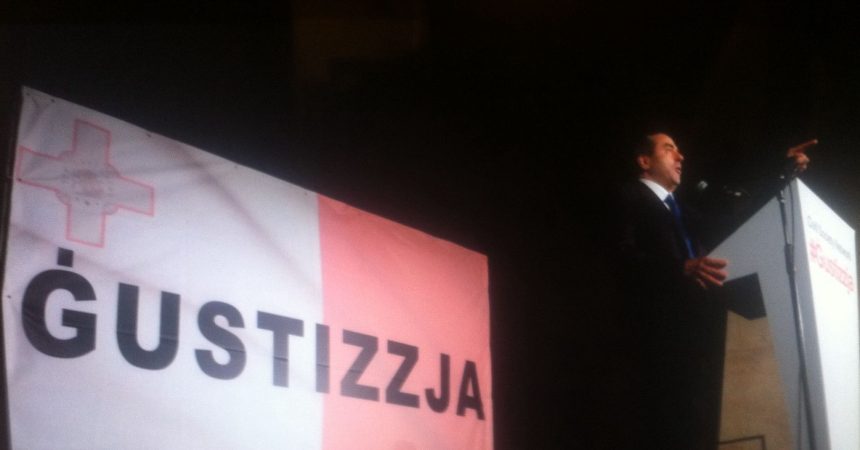Prime Minister Joseph Muscat’s decision to take centre stage by holding a press conference to announce that several arrests were taking place in connection with the assassination of Daphne Caruana Galizia, blurs the division of powers in the country and suggests that Muscat has now assumed the role of police commissioner.
By addressing the press conference alone, Muscat is showing that he either doubts the commissioner’s ability to handle such press announcements or that he wants to take credit for any progress made in the investigation.
Muscat may well be using this case to boost his leadership. As Muscat himself said a few weeks ago “at times like these, people look to leaders for guidance and this is what I plan to offer, now more than ever before.”
The Prime Minister may be trying to make a point that irrespective of past animosity towards the slain journalist, he is keeping his promise not to leave any stone unturned. But that is also a valid reason for Muscat to keep his distance from police investigations.
The press conference should also be seen in a context of a government narrative which reduced Caruana Galizia’s murder to a crime with no political context.
The Prime Minister should instead be focusing on the political context, by taking steps to restore trust in the institutions, while leaving the police to solve the criminal aspects of this case in full autonomy.
Unfortunately, trust in the police is tarnished by the present police commissioner’s failure to investigate other cases like the ones involving Minister Konrad Mizzi and the Prime Minister’s Chief of Staff Keith Schembri.
At this stage, what Antonio Di Pietro said yesterday during the Civil Society Network protest becomes even more relevant.
First of all he dismissed the idea that the murder was some kind of ordinary one that lacked context.
He also noted that Caruana Galizia’s assassination had all the ingredients of a mafia-style killing and seemed like a professional homicide.
“It was professional and a classic mafia-style homicide. Mafia’s style is intimidation. The target was not only poor Caruana Galizia, who was killed, but all those around her because it was a clear warning: be careful or you’ll suffer the same fate,” he said.
In this context he also warned that; “it is not only important to find out who did it but, more importantly, who was behind it.”
While any arrests leading to justice is welcome news, this will not make Malta’s institutional problems go away. The problem is that trust in the institutions is at an all time low for reasons well documented by last week’s MEP delegation. To face the power of organised crime which may be behind Daphne’s murder, we need to get our house in order fast.
Di Pietro also said other very important things which addressed the big picture.
He warned that calling Malta a mafia state amounts to “accusing everyone so no one is found guilty”. What we must do is to “remove the rotten apples” in this basket. “If we don’t, we risk infection”.
He also warned Maltese society about becoming too complacent with corruption simply because wealth is being generated.
“It is not true that you can live well with corruption. You can live well with corruption today or tomorrow. But in time few will be well, for many it will be bad. You cannot just accept to live with this”.
Di Pietro also gave a very stark reply to those who invoke majority rule to justify government inertia on corruption.
“There’s only democracy if the law is respected. Otherwise it would not be a democracy. It would be an empire for the few who exploit the many”.
Di Pietro was measured in every word he said. Maltese politicians would do well take a leaf out of his ‘mani pulite’ (clean hands) book. Beyond the spin, there are some essential truths that are glaring us in the face. We can only ignore them at our own peril.
Even in sensitive moments like these, government propagandists like Labour MP Glenn Bedingfield, cannot resist making partisan attacks on government critics.

Bedingfield was obviously very keen to maximise the planned PR for the Prime Minister’s press conference this morning. Not so fast. He was way out of line, and his outburst spoke volumes on the government’s democratic credentials and the way it is handling this case.













